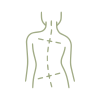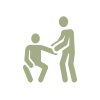Applied Kinesiology
In my practice, I use applied kinesiology (AK) as a well-founded diagnostic method to investigate in depth at which levels of the body problems are present. The actual cause of complaints is often not to be found directly at the site of the symptom, but lies in complex interactions between the physical structure – i.e. muscles and joints – biochemical processes – such as metabolic disorders, allergies, chronic infections or exposure to environmental toxins – and psychological factors, including psychological trauma, everyday stress and emotional strain. The founder of AK coined the term “triad of health” to describe the interplay between these three levels.
The methodological basis of AK is specific muscle tests, which are used to analyze the functionality of the muscles and the neuromuscular feedback loops. These loops are crucial for the control of the muscles by the nervous system. The muscle tests can be influenced by various disorders or by targeted provocations from the therapist. The resulting functional changes caused by diagnostic stimuli – whether of a chemical, mechanical or emotional nature – form the core of the diagnostic possibilities of AK. They provide valuable information and support me in the selection of customized therapeutic approaches for my patients.
During treatment, I combine the principles of applied kinesiology with those of osteopathy. This combination enables me to offer an in-depth and holistic therapy that is designed to effectively treat both the symptoms and the underlying causes, thus achieving the best possible outcome for the patient. This integrative approach allows me to address a wide range of conditions and promote a lasting improvement in my patients’ health.
Treatment procedure

medical history

examination

treatment

exercises
Frequently asked questions about Applied Kinesiology
Applied kinesiology uses muscle testing to identify imbalances in the body, which can have both physical and psychological causes. By diagnosing and treating these imbalances, kinesiology can help to relieve pain, improve posture and enhance overall well-being.
Yes, applied kinesiology is a safe method based on non-invasive techniques. It is individually tailored to the needs of each patient and carried out by experienced therapists who specialize in gentle corrections.
The frequency of treatments may vary depending on your specific symptoms and goals. We usually recommend starting with an initial consultation to assess your situation and develop an individualized treatment plan. Subsequent sessions will be based on your progress and your therapist's recommendations.
Absolutely. Applied Kinesiology can effectively help manage stress and emotional issues by addressing the physical effects of stress and offering techniques for relaxation and emotional release.
By balancing muscles and improving neuromuscular communication, Applied Kinesiology can help to improve athletic performance. This includes improved strength, flexibility and coordination, which ultimately leads to better and safer sporting activity.
Yes, in Applied Kinesiology we use specific techniques that are tailored to the nature of the complaint and the individual needs of the patient. These can include mechanical, chemical or emotional stimuli to address different aspects of health.
We encourage interdisciplinary collaboration with other health specialists such as doctors, nutritionists and psychologists to ensure comprehensive treatment and optimal health. This collaboration enables a holistic view of your health and supports the development of an effective treatment plan.
Treatment costs
130,00 €
Duration time 50-60 minutes
Flexible treatment times
A 90 or 120 minute treatment can also be arranged on request
Cancellation of appointment
Please cancel your appointment at least 24 hours in advance. For organizational and economic reasons, I will otherwise have to charge you for the appointment.
Health insurance approval
Due to my full-time training with 4264 teaching hours, many health insurance companies subsidize the treatment costs. Some private health insurance companies and supplementary health insurance companies even cover the costs in full.